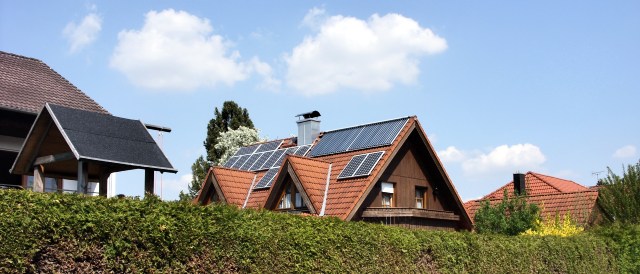The French call it “autoproduction”; the Germans, “own consumption.” Whatever you call it, it’s becoming more popular, which may be why the German government wants to have it cover the cost of the transition as well. Craig Morris says recent policy proposals constitute an about-face and warns against stop-and-go policy support.

Own consumption – first encouraged, now under scrutiny. (Photo by Gumtau, CC BY-NC-SA 2.0)
Some companies, such as BASF and German railway operator Deutsche Bahn, have their own power plants. In the case of BASF, it’s a gas turbine, whereas Deutsche Bahn has coal plants. By generating their own power (and potentially heat), these firms can theoretically reduce energy expenses, for instance by getting around grid fees and taxes on power from the grid. For renewables, the German government even encouraged firms and citizens to consume their electricity directly by offering a special bonus for this “own consumption” starting in 2009.
I have always been critical of this policy for renewables. The main problem is the vicious circle: the more expensive power from the grid gets, the greater the incentive to “autoproduce” – and as less and less power is consumed from the grid, the more expensive the grid becomes. Essentially, grids become stranded assets. And because the grid is a good thing, this trend is something to keep in check, not to promote.
Now, the German government wants to clamp down on the movement towards direct consumption. I suppose I therefore should be happy, but I’m not. The change is coming in a way that is potentially unfair, and the reasoning is flawed.
In his recent keynote presentation (video in German) at the Böll Foundation’s Energiewende 2.0 conference, German Industry Undersecretary Rainer Baake complained that businesses and citizens are increasingly building power generators “to get around the renewables surcharge.” Of course they are; the government even provided them with an “own consumption” bonus for renewable electricity never exported to the grid. Now, those who reacted to governmental encouragement and invested in, say, battery storage systems, are being accused of gaming the system.
The real problem is not the renewables surcharge, though – it’s grid fees. They are currently tacked onto each kilowatt-hour consumed, so those who buy less power from the grid (= variable) cover less of the (fixed) costs – even though they still need the grid. A fairer plan would charge a flat fee per connection level (based on voltage, for instance), though that conflicts with incentives for efficiency as I explained last year.
Granted, Baake suggests in his keynote that existing generators and storage systems might be grandfathered in, so policy changes might not be applied retroactively. But perhaps more than any other policy issue, the handling of power directly consumed shows that the German government does not have a long-term assessment of what is needed. Without an understanding of what will be needed by 2050 – the last year for which Germany has energy targets – it will not be possible to design short and mid-term incentives that lead investors in the right direction. Germany has been successful in its transition up to now partly because of policy continuity. The about-face on “own consumption” could be the first major exception.
Craig Morris (@PPchef) is the lead author of German Energy Transition. He directs Petite Planète and writes every workday for Renewables International.
I did not realize Baake was anti-self-consumption – aka: 2U systems… makes solar farms U2 systems. It’s a compact formulation of the idea and it’s nicely reversible. Own consumption, self-consumption etc just don’t roll off the tongue and they sound a bit like diseases from the 19th century.
It’s a slippery slope you’re on over there. If the surcharge gets tacked onto self-consumption then you’re a hop skip from taxes on self-consumption? Doesn’t make sense to me. Are we to tax home cooked meals next? Doing your own housework? Watching home movies?
There’s something strangely illegal about the idea but I can’t put my finger on it. I didn’t realize there was even a requirement to meter self-consumption.